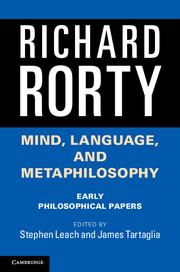Book contents
- Frontmatter
- Contents
- Foreword
- Acknowledgments
- Introduction
- 1 Pragmatism, categories, and language
- 2 The limits of reductionism
- 3 Realism, categories, and the “linguistic turn”
- 4 The subjectivist principle and the linguistic turn
- 5 Empiricism, extensionalism, and reductionism
- 6 Mind-body identity, privacy, and categories
- 7 Do analysts and metaphysicians disagree?
- 8 Incorrigibility as the mark of the mental
- 9 Wittgenstein, privileged access, and incommunicability
- 10 In defense of eliminative materialism
- 11 Cartesian epistemology and changes in ontology
- 12 Strawson’s objectivity argument
- 13 Verificationism and transcendental arguments
- 14 Indeterminacy of translation and of truth
- 15 Dennett on awareness
- 16 Functionalism, machines, and incorrigibility
- Index of names
- References
12 - Strawson’s objectivity argument
Published online by Cambridge University Press: 05 June 2014
- Frontmatter
- Contents
- Foreword
- Acknowledgments
- Introduction
- 1 Pragmatism, categories, and language
- 2 The limits of reductionism
- 3 Realism, categories, and the “linguistic turn”
- 4 The subjectivist principle and the linguistic turn
- 5 Empiricism, extensionalism, and reductionism
- 6 Mind-body identity, privacy, and categories
- 7 Do analysts and metaphysicians disagree?
- 8 Incorrigibility as the mark of the mental
- 9 Wittgenstein, privileged access, and incommunicability
- 10 In defense of eliminative materialism
- 11 Cartesian epistemology and changes in ontology
- 12 Strawson’s objectivity argument
- 13 Verificationism and transcendental arguments
- 14 Indeterminacy of translation and of truth
- 15 Dennett on awareness
- 16 Functionalism, machines, and incorrigibility
- Index of names
- References
Summary
In his recent book on Kant, Strawson has offered a new and improved version of the central argument of the Transcendental Deduction – the argument that the possibility of experience somehow involves the possibility of experience of objects. This argument has a fair claim to be called the central argument of the Critique as a whole, since it is the argument which gives Kant’s justification for breaking with the traditional Cartesian notion of a veil of perceptions which separates the mind from the world, and insisting that the world is, in some sense, given whenever experience is given. Strawson’s account of this argument is an attempt to follow the lead Kant gives without getting involved in the “theory of synthesis” in terms of which Kant presents the Deduction. I think that this attempt is just what is needed in order to explicate Kant’s insight, but I think also that Strawson has not entirely succeeded in disentangling the underlying “analytic” argument from the misguided Kantian picture of intuitions and concepts as distinguishable sorts of representations. In this chapter, I offer an exegesis of this passage in Strawson, and I suggest revisions of, and additions to, his arguments.
Early in The Bounds of Sense, Strawson gives us the plot of the Critique in the form of six theses which Kant wishes to expound. I quote from this passage the two theses which are most clearly relevant to the Transcendental Deduction:
that there must be such unity among the members of some temporally extended series of experiences as is required for the possibility of self-consciousness, or self-ascription of experiences, on the part of a subject of such experiences (the thesis of the “necessary unity of consciousness”);
that experience must include awareness of objects which are distinguishable from experiences of them in the sense that judgements about these objects are judgements about what is the case irrespective of the actual occurrence of particular subjective experiences of them (the objectivity thesis).
(p. 24)Information
- Type
- Chapter
- Information
- Mind, Language, and MetaphilosophyEarly Philosophical Papers, pp. 227 - 259Publisher: Cambridge University PressPrint publication year: 2014
